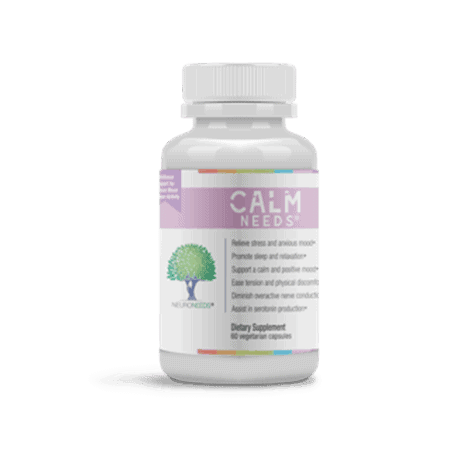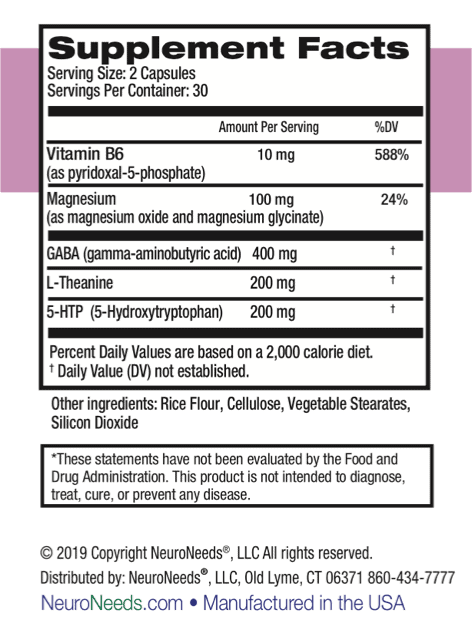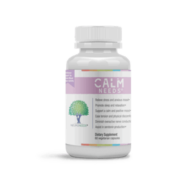CalmNeeds® – 60 capsules
CAD$63.45 Import fees, brokerage, duties incl.
Pharmaceutical medications are not the only treatment available for behavioral over-activity. Nutritional supplements are often recommended for individuals with various forms of behavioral over-activity, including hyperactivity, fidgeting, aggression, and impulsivity.
CalmNeeds® contains a combination of Vitamins B6, magnesium, L-theanine, 5-HTP, and GABA, and offers a unique and natural path to calmness, day or night.*
CalmNeeds is free of all common allergens including gluten, dairy, casein, eggs, soy, fish, shellfish, peanuts, and nuts.
CalmNeeds does NOT contain any Artificial Colors, Artificial Sweeteners, Preservatives, or GMO’s.
- As a dietary supplement, take 2 capsules per day or as directed by your healthcare practitioner.
- Sensitive individuals may wish to start with 1 capsule first, and increase to 2 capsules as indicated and tolerated.
- For children under the age of 18 years old, consult your healthcare practitioner. However, 1 capsule is generally appropriate for children ages 6-12, with one or two capsules in adolescents.
- To promote calming throughout the day, take two times a day.
- To promote sleep, take about 30 minutes before bedtime.
- To avoid nausea, take with food.
CalmNeeds® offers a unique and natural path to calmness, day or night.* This formula contains a combination of Vitamins B6, magnesium, L-theanine, 5-HTP, and GABA designed to:
- Relieve stress and anxiety.
- Promote sleep and relaxation.
- Support a calm and positive mood.
- Ease nervous tension and pain.
- Diminish overactive nerve conduction.
- Assist in serotonin production.
Manifestations of behavioral over-activity is quite common in people with neurodevelopmental disorders, as well as in the general population. These manifestations can include:
- Episodes of aggression
- Fidgeting/stereotypic movements/hyperkinesis
- Hyperactivity
- Impulsivity
- Seizures
These manifestations are very common in autism, and in attention-deficit/hyperactivity disorder (ADHD).
Behavioral over-activity is generally treated by medications, whether in autism, ADHD, other neurodevelopmental disorders, or neurotypical individuals. However, medications are not the only treatment available. In particular, nutritional supplements are often recommended for individuals with various forms of behavioral over-activity.
Supplements should be considered for the treatment of behavioral over-activity in the following settings:
- Mildly-affected individuals who potentially do not warrant a medication trial.
- Families wishing to use natural therapies first, and medications if indeed warranted.
- Individuals who are very sensitive to psychotropic medications.
- Families that are reluctant to give psychotropic medications due to concern regarding adverse effects.
- Individuals who have failed trials with psychotropic medications due to lack of effect or significant adverse effects.
Medications are often effective and appropriate in the treatment of behavioral over-activity, and in particular in ADHD can help get a failing student back on track again. NeuroNeeds does not advocate nutrition over medication in all or most cases. However, appropriate nutritional therapies can often be an effective complementary approach along with appropriate medical therapies. In Dr. Boles’ experience, nutritional therapies can sometimes reduce the amount of dosage of medication needed, and occasionally eliminate the needs for medications altogether. In addition, medications are not appropriate in all affected individuals.
CalmNeeds® consists of 5 natural ingredients, each of which can assist in behavioral over-activity, and are often used together. The following section discusses some each of these ingredients in brief. References are chosen in part based on relevance to ADHD, a very common neurodevelopmental disorder, and in order to educate as well as to substantiate the text.
Vitamin B6 – Also known as pyridoxine, B6 cannot be manufactured by humans and is obtained exclusively from the diet. In particular, B6 is necessary for creating neurotransmitters that regulate emotions, including serotonin, dopamine and gamma-aminobutyric acid (GABA). B6 deficiency is generally found in individuals with highly-restricted diets and/or substantial gastrointestinal disease. B6 is present in a wide variety of nutritional supplements, including multivitamins.
https://www.ncbi.nlm.nih.gov/books/NBK507249/
Magnesium – Magnesium is a mineral that must be obtained in the diet in relatively large quantities. Magnesium deficiency is not rare, and the majority of Americans ingest sub-optimal amounts. Magnesium deficiency is particularly common in vulnerable populations, including people with gastrointestinal disease. Supplementation with magnesium appears to be especially helpful for alleviating hyperactivity in children. In a group of children supplemented with magnesium for six months, there was “an increase in magnesium contents in hair and a significant decrease of hyperactivity” compared to children in the control group who had not been treated with supplemental magnesium. Magnesium is present in a wide variant of supplements, including digestion aids and multivitamins.
https://www.ncbi.nlm.nih.gov/books/NBK507249/
L-theanine – L-theanine is similar to the amino acids L-glutamate and L-glutamine and is naturally found in many plants. L-theanine is particular abundant in many teas, and responsible in part for the calming aspect of tea. One study demonstrates that L-theanine is safe and effective in improving some aspects of sleep quality in boys diagnosed with ADHD. L-theanine is present in a wide variety of foods and beverages, as well as supplements. L-theanine is often paired with GABA and is thought to augment the effects of GABA supplementation.
https://www.ncbi.nlm.nih.gov/pubmed/22214254
https://www.ncbi.nlm.nih.gov/pubmed/18296328
5-HTP – 5-hydroxytryptophan or 5-HTP is a naturally-occurring amino acid produced from tryptophan, which is converted to the neurotransmitter serotonin. Serotonin is a contributor to feelings of well-being and happiness, as well as modulating cognition, reward, learning, memory, and numerous physiological processes. Serotonin is particularly important in digestion. 5-HTP is marketed in the United States and other countries as a dietary supplement for use as an antidepressant, appetite suppressant, and sleep aid.
https://www.ncbi.nlm.nih.gov/pmc/articles/PMC3035600/
GABA – GABA, or gamma aminobutyric acid, is a (non-protein) amino acid which acts as an inhibitory neurotransmitter for the central nervous system. GABA blocks nerve impulses so that nerve cells do not fire too frequently. Individuals who have symptoms of ADHD, autism, anxiety, and depression may have a GABA deficiency. The lack of this brain chemical is said to cause symptoms which may include: brain fog, mood swings, increased stress, anxiety, depression, insomnia, irritability, and aggression. GABA is present in a variety of supplements.
https://ajp.psychiatryonline.org/doi/10.1176/appi.ajp.161.12.2186
https://www.healthcentral.com/article/supplements-to-treat-your-childs-adhd-gaba
The combination helps promote a relaxed state.
Consult your physician as to whether CalmNeeds® is right in you or your child.
*This statement has not been evaluated by the U.S. Food and Drug administration. The product is not intended to diagnose, treat, cure, or prevent any disease.








